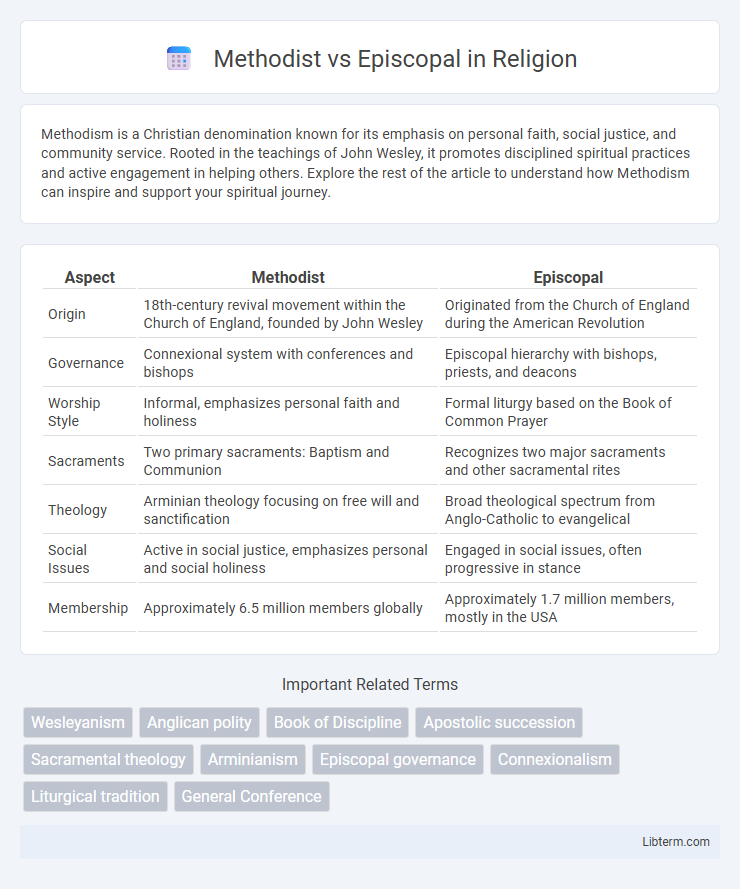Methodism is a Christian denomination known for its emphasis on personal faith, social justice, and community service. Rooted in the teachings of John Wesley, it promotes disciplined spiritual practices and active engagement in helping others. Explore the rest of the article to understand how Methodism can inspire and support your spiritual journey.
Table of Comparison
| Aspect | Methodist | Episcopal |
|---|---|---|
| Origin | 18th-century revival movement within the Church of England, founded by John Wesley | Originated from the Church of England during the American Revolution |
| Governance | Connexional system with conferences and bishops | Episcopal hierarchy with bishops, priests, and deacons |
| Worship Style | Informal, emphasizes personal faith and holiness | Formal liturgy based on the Book of Common Prayer |
| Sacraments | Two primary sacraments: Baptism and Communion | Recognizes two major sacraments and other sacramental rites |
| Theology | Arminian theology focusing on free will and sanctification | Broad theological spectrum from Anglo-Catholic to evangelical |
| Social Issues | Active in social justice, emphasizes personal and social holiness | Engaged in social issues, often progressive in stance |
| Membership | Approximately 6.5 million members globally | Approximately 1.7 million members, mostly in the USA |
Introduction to Methodist and Episcopal Churches
Methodist and Episcopal Churches both originated from the Christian tradition but differ in governance and worship style. The Methodist Church, founded by John Wesley in the 18th century, emphasizes personal faith, social justice, and a methodical approach to scripture and prayer. The Episcopal Church, part of the Anglican Communion, maintains a liturgical worship structure, with a hierarchical leadership led by bishops and a strong connection to historic Catholic traditions.
Historical Origins and Development
Methodism originated in the 18th century as a movement within the Church of England led by John Wesley, emphasizing personal holiness and social justice. The Episcopal Church, rooted in the Church of England, was formally established in the United States after the American Revolution, maintaining a hierarchical structure with bishops. While both traditions share Anglican heritage, Methodism developed a more revivalist approach and organized into distinct denominations, whereas Episcopalianism retained liturgical and sacramental practices aligned with Anglicanism.
Core Theological Beliefs
Methodist theology emphasizes prevenient grace, sanctification, and the possibility of Christian perfection, highlighting personal holiness and a transformative faith experience. Episcopal beliefs center on the authority of Scripture, tradition, and reason, stressing the sacraments, apostolic succession, and liturgical worship as means of grace. Both traditions uphold the Nicene Creed and affirm the divinity of Christ but diverge in ecclesiology and the role of church hierarchy.
Structure and Church Governance
Methodist churches typically employ a connexional system emphasizing episcopal oversight combined with conferences that include both clergy and laity, ensuring shared decision-making and accountability across districts and annual conferences. Episcopal churches operate under a hierarchical structure led by bishops who have ecclesiastical authority over dioceses, with authority flowing top-down from the General Convention to individual parishes. While both traditions integrate episcopal leadership, Methodism balances this with significant lay participation through conference assemblies, whereas Episcopalian governance relies more heavily on canonical law and formal synods for decision-making.
Worship Practices and Liturgy
Methodist worship is characterized by a balance of structured liturgy and extemporaneous elements, emphasizing hymn singing, spontaneous prayer, and personal testimony, while maintaining a flexible order of service. Episcopal worship follows a formal, sacramental liturgy rooted in the Book of Common Prayer, featuring set prayers, responses, and a strong emphasis on the Eucharist as the central act of worship. Both traditions value communal participation, but Episcopalians prioritize ritual and sacrament, whereas Methodists emphasize heartfelt expression and scriptural preaching.
Sacraments and Rituals
The Methodist Church practices two primary sacraments: Baptism and the Lord's Supper, emphasizing grace and personal faith experience through open communion and infant or adult baptism. The Episcopal Church recognizes seven sacraments, including Baptism, Eucharist, Confirmation, Confession, Matrimony, Holy Orders, and Anointing of the Sick, with a strong focus on liturgical ritual and apostolic tradition. Episcopal rituals are more formal and sacramental in nature, often involving structured liturgies, while Methodist worship tends to be more flexible and centered on scripture and personal holiness.
Role of Clergy and Leadership
Methodist clergy include ordained elders and deacons who lead worship, administer sacraments, and provide pastoral care, with leadership structures emphasizing connectionalism through conferences and superintendents. Episcopal clergy consist of bishops, priests, and deacons, with bishops holding significant authority over dioceses, ordaining clergy, and ensuring doctrinal unity, reflecting a hierarchical governance system. Both traditions value ordained ministry but differ in episcopal authority and the scope of lay participation in church leadership.
Social Justice and Community Engagement
Methodist and Episcopal churches both prioritize social justice and community engagement through active outreach programs and advocacy for marginalized groups. The United Methodist Church emphasizes social holiness, supporting initiatives like poverty alleviation, racial equality, and environmental stewardship. The Episcopal Church promotes inclusivity and human rights, engaging in efforts such as LGBTQ+ advocacy, immigration reform, and interfaith collaboration to address systemic inequalities.
Stance on Social Issues
Methodist churches generally emphasize social justice and inclusivity, supporting LGBTQ+ rights, gender equality, and efforts to combat poverty and racial discrimination. The Episcopal Church openly endorses same-sex marriage, ordains LGBTQ+ clergy, and advocates for civil rights, environmental stewardship, and social equity. Both denominations actively engage in social activism, but the Episcopal Church is often seen as more progressive in formalizing these stances within its doctrine and policies.
Key Differences and Similarities
Methodist and Episcopal churches both stem from the Anglican tradition, sharing beliefs in the Trinity, the divinity of Jesus Christ, and the importance of sacraments like baptism and communion. Key differences include governance, with Methodists favoring a connectional system led by conferences and Episcopal churches operating under a hierarchical structure headed by bishops. Worship styles vary as well; Episcopalians use a formal liturgy from the Book of Common Prayer, while Methodist services tend to be more flexible and emphasize personal faith and holiness.
Methodist Infographic

 libterm.com
libterm.com